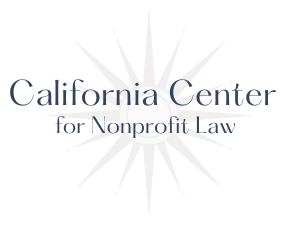
New IRS Supporting Organizations Technical Guides: TG 3-31, 3-32, and 3-33
The Internal Revenue Service (IRS) recently published three technical guides that address each of the three types of supporting organizations and their relationships with their supported organizations.
TG-3-31 addresses Type I Supporting Organizations, TG-3-32 addresses Type II Supporting Organizations, and TG-3-33 addresses Type III Supporting Organizations. The California Center for Nonprofit Law can help guide you through the many legal, regulatory, and tax requirements your charitable organization must follow. Contact our office to learn more about these important issues to keep your charitable organization running smoothly and compliant with all federal, state, and local laws.
Supporting Organizations in General
Section 509(a)(3) of the Internal Revenue Code defines the supporting organization as a category of Section 501(c)(3) organization that falls outside the definition of a private foundation. A supporting organization carries out its exempt purpose by supporting other exempt organizations, which are usually public charities. Generally, supporting organizations are public charities that cannot meet an applicable public support test but are not subject to private foundation rules. However, they are subject to other laws and regulations specific to supporting organizations. Among other requirements, all SOs must pass an organizational test, an operational test, a relationship requirement, and a control test.
TG-3-31 – Type I Supporting Organizations
A Type I Supporting Organization (SO) is operated, supervised, or controlled by its supported organization. The publicly supported organization has a significant degree of control over the conduct of a supporting organization, similar to a parent company-subsidiary relationship. Failure to meet any of the four tests makes an organization ineligible to be an SO. Furthermore, if the SO doesn’t meet another exception, it will be classified as a private foundation.
Organizational Test
The organizational test generally has four requirements that SOs must meet, which include the following:
- Limit the purposes of the organization to benefiting, performing the functions of, or carrying out the purposes of one or more specified organizations described in Sections 509(a)(1) or (2).
- Not expressly empower the organization to engage in activities that do not further the authorized purposes.
- State the specified publicly supported organizations on whose behalf the organization is to be operated.
- Cannot expressly empower the organization to support or benefit any organization other than the specified publicly supported organizations.
Operational Test
To meet the operational test, SOs must engage solely in activities that support or benefit the publicly supported organization, such as:
- Making payments to or for the use of individual members of the charitable class benefited by the specified publicly supported organization.
- Providing services or facilities for individuals of the charitable class benefited by the specified publicly supported organization.
- Using its income to carry on an independent activity or program, which supports or benefits the specified publicly supported organization(s).
Relationship Requirement
The relationship requirement is based on the type of SO, which, in turn, determines its relationship with its supported organization. The SO must have a relationship described above that qualifies it as a Type I, II, or III supporting organization.
Control Test
A SO must not be directly or indirectly controlled by one or more disqualified persons to meet the control test. Disqualified persons are those who are disqualified under Section 4946, “except Section 509(a)(1) or 509(a)(2) organizations or a foundation manager of the supporting organization who is not a disqualified person for another reason.”
TG-3-32 – Type II Supporting Organizations
A Type II SO is supervised or controlled in connection with its supported organization. The organizations involved have common supervision or control among their governing bodies, like a brother-sister relationship. The Organizational, Operational, Relationship, and Control Tests also apply to Type II SOs, just as they do to Type I SOs.
TG-3-33 – Type III Supporting Organizations
A Type III SO is operated in connection with one or more publicly supported organizations. All supporting organizations are responsive to the needs and demands of each supported organization and maintain significant involvement in them. In addition to the required tests listed above, a Type III SO is subject to further tests, including responsiveness and integral part tests.
Responsiveness Test
Type III SOs must pass a Responsive Test, which consists of two parts:
- Governance Structure – A Type III SO must maintain one of three prescribed governance structures with its supported organization, as follows:
- One or more must be elected or appointed by the officers, directors, trustees, or membership of its supported organization(s);One or more must be officers, directors, or trustees of, or hold other important offices in, its supported organization(s); or
- They must maintain a close and continuous working relationship with the officers, directors, or trustees of its supported organization(s).
- Significant Voice – A Type III SO must use its governance structure to give each of its supported organizations “a significant voice in the investment policies of the supporting organization, the timing of grants and the manner of making them, the selection of recipients, and generally the use of the income or assets of the supporting organization.”
Integral Parts Test
The Integral Parts Test requires Type III SOs to satisfy one of two integral parts tests: the functionally-integrated test or the non-functionally-integrated test. These tests demonstrate that an SO “maintains a significant involvement in the operations of its supported organization and provides the support on which its supported organization(s) are dependent.”
- Functionally-Integrated Test – A functionally-integrated SO must meet one of the following:
- Substantially all activities directly further the exempt purposes of its supported organization(s), and but for the supporting organization’s involvement, the supported organization(s) would normally engage in such activities;
- Is the parent of each of its supported organizations; or
- Supports only government-supported organizations.
- Non-Functionally-Integrated Test – A non-functionally-integrated SO must either meet the Distribution and Attentiveness Requirements or be a certain trust established before November 20, 1970.
- The Distribution Requirement requires the SO to make distributions of its distributable amount, which is the greater of:
- 85% of the supporting organization’s adjusted net income for the prior tax year; or
- Its minimum asset amount for the prior tax year, which is 3.5% of the excess of the aggregate fair market value of all of its non-exempt-use assets over the acquisition indebtedness from such non-exempt-use assets (after certain adjustments).
- The Attentiveness Requirement requires the SO to distribute one-third or more of its distributable amount to one or more supported organizations that are attentive to its operations. A supported organization is attentive to the operations of the SO if it meets one of the following requirements:
- The supporting organization distributed to the supported organization at least 10% of the supported organization’s total support in the prior tax year.
- The support received from the supporting organization is necessary to avoid the interruption of a particular function or activity of the supported organization.
- The Distribution Requirement requires the SO to make distributions of its distributable amount, which is the greater of:
The amount of support received by the supported organization from the supporting organization must be sufficient to ensure attentiveness by the supported organization, and there must be evidence of such attentiveness.
Allow Us to Meet Your Legal Needs
The California Center for Nonprofit Law dedicates its efforts to the daily legal matters that charities face, including ongoing compliance with local, state, and federal law. Call us today at (949) 892-1221 and schedule a time to discuss your case. Get your questions answered and learn more about how we can help.
